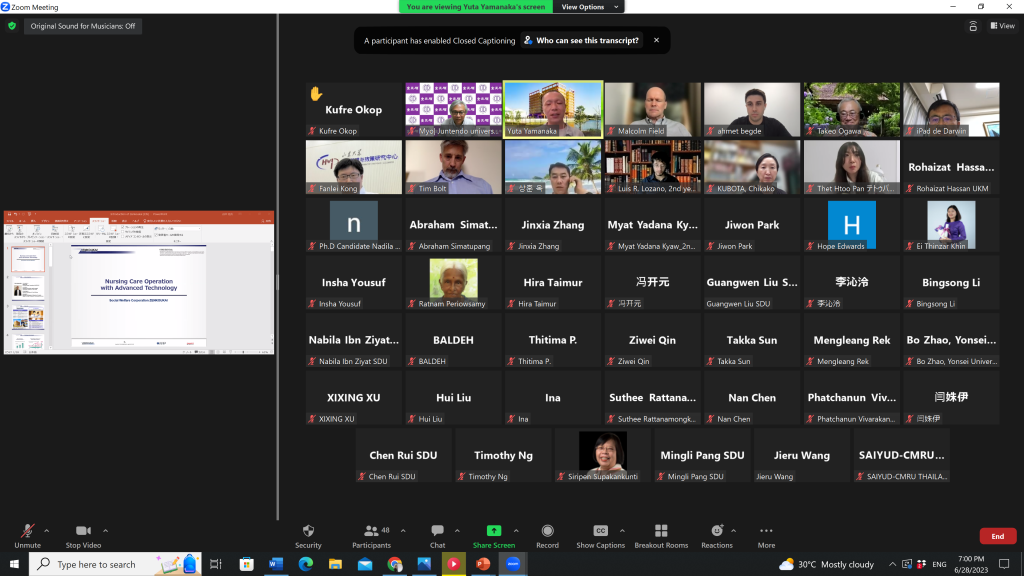17th DIHAC cross-cultural exchange meeting analysis report
Operating Long-Term Care with Advanced Technology in Japan and Unveiling the Older Generations’ Willingness to Use Digital Technology in UK
17th DIHAC cross-cultural exchange meeting report
Myat Yadana Kyaw, Thet Htoo Pan, Nadila Mulati, Yamanaka Yuta, Ahmet Begde, Myo Nyein Aung and Malcolm Field
The fast-paced development of technology benefits older people, as well as their caregivers, and these are the two main topics that were discussed in the 17th Digitally Inclusive, Healthy Ageing Communities (DIHAC) meeting on 28th of June 2023 by Zoom.
The 17th cross-cultural meeting was attended by forty-eight international participants. The investigator of the DIHAC study, Professor Malcolm Field chaired this meeting. Associate professor Myo Nyein Aung from Juntendo University, principal investigator of DIHAC study socialized with the international participants. Chairperson Professor Malcolm Field gave an opening speech on how the challenge of ageing related diseases, especially dementia posed increasing challenges to the families and systems across the world. He expressed his interest in the impact of technology in overcoming challenges and welcomed the speakers.

Figure 1: Screenshot of the 17th DIHAC meeting in Zoom meeting hosted by Associated Professor Myo Nyein Aung and chaired by DIHAC adviser and investigator, Professor Malcolm Field, speakers, and international participants.
The first presenter, Mr.Yuta Yamanaka, a researcher and data analyst from the Zenkoukai Social Welfare Association [1], Japan, introduced smart caregiving, and the operation of nursing care with advanced technology. Mr. Yamanaka introduced several robotic technologies infused into the daily caregiving of their nursing home residents, allowing them to have a better quality of life and an effective and efficient workplace for the caregivers. In a room of resident care, there are sensors for detecting awake and fall, sleep quality sensors, and ultrasonic urine quantity sensors on the bed. Through these sensors, caregivers can provide residents with optimal care in daily living activities according to their needs. On the side of the caregivers, the notifications from each sensor are collectively informed in a smart caregiving app on a mobile device so that caregivers can have the fastest knowledge of care recipients’ conditions in minimal time. With the aid of robots and cutting-edge technology, Zenkoukai has offered great quality care with minimal staff and overcoming the issues of reduced human resources for care. The innovative work of Zenkoukai inspired the participants to further in-depth discussion on the cost- effectiveness of their services and the satisfaction levels of caregiving staff following the integration of technology into their conventional practices. Accompanied by the advantages of robotic technology, possible challenges relating to the sustainability of service delivery and its quality, the necessity for caregivers to enhance their skills in utilizing smart devices, and the critical point of ensuring patient data privacy for the care recipient should also be considered.Furthermore, the evaluations of such integration are crucial for further policy development and implementation regarding human resources and service delivery of long-term care.
The second presentation was delivered by Mr. Ahmet Begde, MSc, a Doctoral Researcher from Loughborough University, United Kingdom (UK). Mr. Bedge presented the findings from his recent publication, which aimed to examine the predicting factors of older adults to use technology that promotes memory and Activity of Daily Living (ADL). The research was conducted using data from the Cognitive Function and Ageing Study II, a large-scale survey conducted in the United Kingdom which showed that older adults are more willing to use assisted technology that helps to improve memory than the technology for ADL. Older age, being female, self-reported slower physical function, and lack of access to laptops and tablets are predictors of a lower likelihood to use assisted technology for memory and reduced willingness to use technology for improving physical function. The research finding highlighted the importance to address digital access and the knowledge gap among the older population, especially for those who are more vulnerable to adoption. After the presentation, discussion among participants took place regarding the digital divide, digital inclusion, and the empowerment of older adults in the context of UK. In conclusion, as societies continue to address challenges brought on by population aging, a reduced workforce of caregiving, and increased family burden, the insights from the 17th DIHAC meeting shed light on the promising role of integrating technology into long-term care for healthy aging of older adults as well as reducing the caregiver burden in the nursing care facilities. Implementing policies and interventions aimed at bridging the digital access gap and empowering older individuals with digital skills, knowledge, and confidence could foster their greater inclusion in our rapidly digitizing world.
References:
1. 社会福祉法人 善光会.
2. Begde, A., et al., Exploring factors influencing willingness of older adults to use assistive technologies: evidence from the cognitive function and ageing study II. Information Communication & Society, 2023.
Myat Yadana Kyaw, MD, is a Ph.D. student at the Department of Global Health Research, Graduate School of Medicine, Juntendo University, Tokyo, Japan.
Thet Htoo Pan, MD, is a Ph.D. student at the Department of Global Health Research, Graduate School of Medicine, Juntendo University, Tokyo, Japan.
Nadila Mulati, MSc, is a Ph.D. student at the Department of Global Health Research, Graduate School of Medicine, Juntendo University, Tokyo, Japan.
Yamanaka Yuta, MSc, is a researcher from Zenkoukai Social Welfare Corporation
Ahmet Begde, MSc, is a Doctoral Researcher at the National Centre for Sport and Exercise Medicine (NCSEM), School of Sport, Exercise and Health Sciences, Loughborough University, United Kingdom
Myo Nyein Aung, MD, MSc, Ph.D. is an Associate Professor at the Department of Global Health Research, Graduate School of Medicine, Juntendo University, Tokyo, Japan.
Malcolm Field, PhD, is a Professor at Kyorin University, Faculty of Social Sciences and Waseda University, Faculty of International Liberal Arts.
